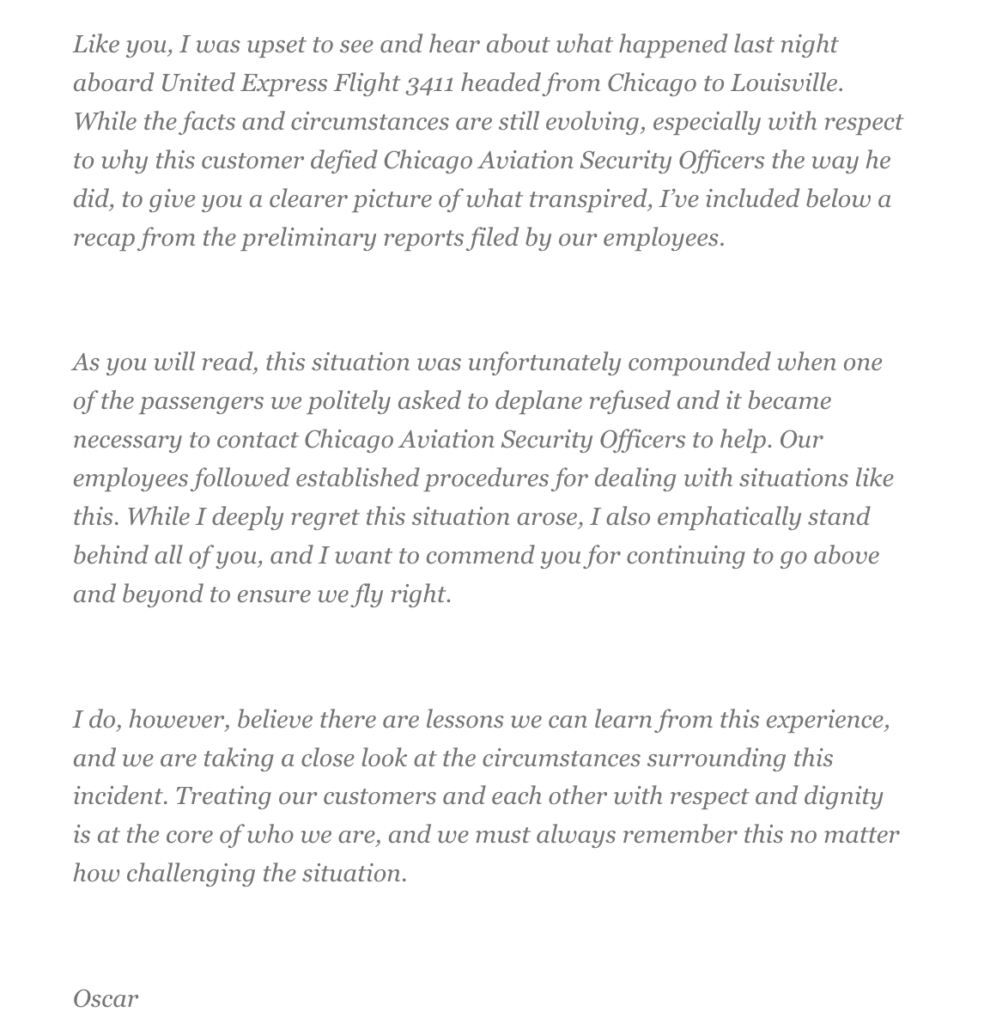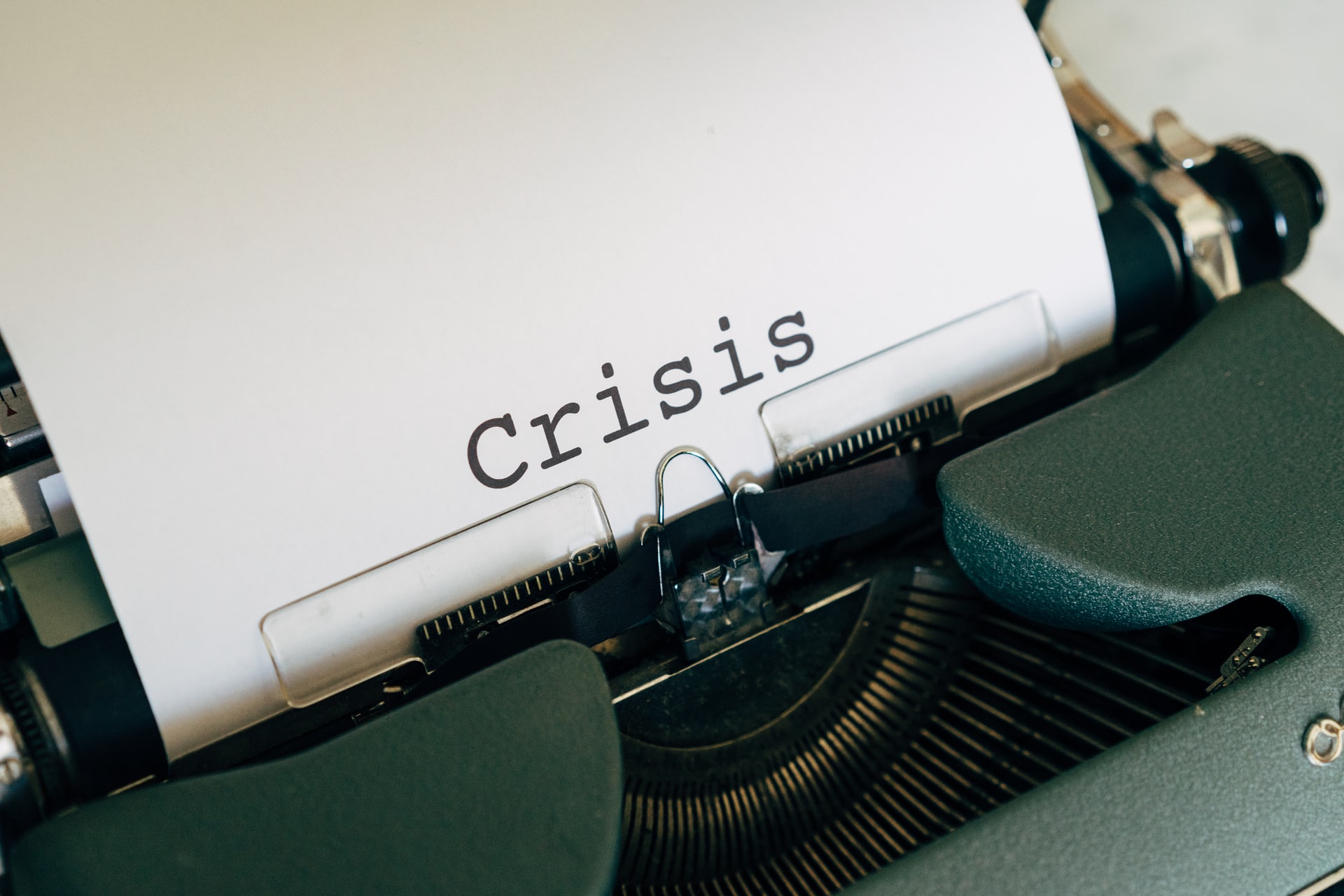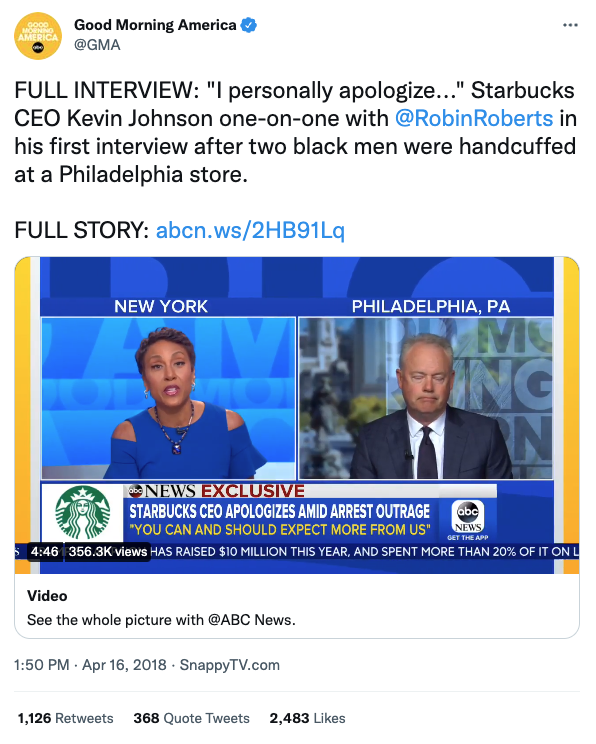Crises come in all shapes and sizes, but we see three types of situations the most. First, there is the known crisis, where you know something terrible will happen and have some time to plan for it. Second, there is the unknown crisis, where something comes from nowhere and blindsides you. And third, there is the indirect crisis, where an event happens to someone else that impacts your business.
A crisis is not a good time to build brand equity with your audience. However, you can spend it. Those with an established track record of a strong company brand that includes the CEO’s personal branding are more likely to be given second chances.
Branding is about personality, and the traits of the CEO transpose onto the business. When you build a personal brand that is reliable and robust, you can be consistent in your interactions with the target audience and quickly become familiar with them.
This consistency will build trust among your target audience, allowing an emotional connection between your company's brand and the target audience. This is an asset and a commodity that you can rely on in a crisis.
Here’s how personal branding can help you define crisis management:
The value of a personal brand
Your personal brand is about how others view you – customers, investors, employees, peers- and how you come across in-person and online. As CEOs become increasingly accessible through their social media accounts, they have more opportunities to build their profiles and connect with their audience on a more personal level.
Of course, personal branding is something all CEOs should take seriously. It's not just about building trust and credibility among your audience: research shows that their personality can directly impact share prices, crucial during crises.
In fact, we often expect visibility and a vocal presence from CEOs as the leaders of their companies and organizations in a crisis. They are the voice of their companies, both internally and externally. As the world becomes increasingly connected and transparent, CEOs also have more opportunities to take a stand on issues that matter to them, their employees, and their customers.

If a CEO has a bad reputation, it can affect the company's brand in the minds of its stakeholders. Crises can make and break reputations.
Customers don't just buy based on a product or service; they buy into a company. And today, with the trend towards personalization and social media, they buy into the people behind the company – particularly the CEO.
As Little PR Rock Marketing, my brand is my reputation; I am aware of it at all times and aspire to build a strong one. I had a 10-year career as a Media Officer at a charity, including managing their external crisis communications during the pandemic. Now, I am self-employed and have been helping small business owners, entrepreneurs, consultants, authors, speakers, and also existing employees think about how they can brand themselves online or improve their brand.
I have seven qualities that I think are essential to creating a solid personal brand as a CEO that are effective in a crisis:
7 critical areas for building a solid personal brand
1. Expertise
As experts and thought leaders, CEOs need to see what's coming in the business world and have testimonies of leveling up in a crisis. Their brand needs to show them as having the information and data they need to analyze what can break the sales process. Such analysis at all times will hold them in good stead, but especially when disaster strikes.
I suggest that an ability to delegate, make recommendations and demonstrate that you are familiar with data enhances a CEO's personal brand. Business experts need a reputation for listening to the best advice and doing the right thing.
Many words get thrown around in marketing: brand, thought leadership, differentiation. Usually, in terms of an organization's "brand" or "differentiation," we refer to the product or service you sell, your history and reputation, or your culture and values.
But here's a more fundamental concept: the foundation for all other marketing and branding efforts that I think of as "The Big Three". According to Scott Baradell, Chief Executive of Idea Grove, these key factors unite consumers with brands and can resonate beyond sales when they work together.
1. Product = Body
2. Thought leadership = Mind
3. Social purpose = Heart
When a business implements a thought leadership strategy, the traits of the CEO become just as crucial as that strategy. The CEO becomes the “Mind” of the company.
The “Mind” creates the vision statement that drives the company. Vision is, by its very nature, a human quality. Our ability to see into the future, take a long-term view, and understand the risks and opportunities ahead sets us apart from other creatures.
Personal branding needs a vision, just like the company brand. We may not get everything right, but our ability to plan and make choices about what matters most to us is a defining feature of being human. Personal branding is essential in a crisis because it provides the reassurance needed on a human level.
2. Voice
A CEO connects to "social purpose" on a deeper human level than a company. Millennials, in particular, are increasingly buying on values and willing to pay more for sustainable brands.
Data shows that companies that build social purpose into their business models outperform the market. But here's the thing. What if it's not just Millennials? What if we're all increasingly interested in buying from companies with a clear social purpose? In times of crisis, opinions can be polarising. However, personal branding is the glue that binds customers to a company.
One of the things I learned during the pandemic is that a CEO needs to have a strong voice and stand for something so that people know that they can rely on you to speak for them. I have learned the importance of honesty, humanity, and patience. I learned how necessary it is to keep all stakeholders informed in communication: silence is not an option.
A CEO's personal brand needs to have the reputation of someone who keeps providing as much information as possible. There is a power to having a limited number of key messages as a CEO and the ability to show how you should use facts and figures, and anecdotes to support those messages.
Over the past two years, I also came to appreciate the power of speaking plain English without jargon; transparency; and answering questions, anticipating the worst questions. Providing a no-nonsense personal brand answers that brief. The tone matters, too: a big part of it is staying calm when under pressure.
Working out ways to do this in advance and demonstrate your traits to your stakeholders through your personal brand is crucial because when you are under pressure, you won't be able to think as clearly. Often second chances are the luxury of those with an established reputation. Is there a better way to set the tone for the company than the personal brand of the CEO when it matters?
3. Consistency - Be consistently YOU
That typical "know, like, and trust" factor is the basis of all relationships. As a CEO, you need to take it one step further to equip yourself for crises. You don't need to please everyone, but you have to have an opinion.

In business and life, people buy into confidence, not competence. Your personal brand determines what people say about you, not what you tell them about yourself in your marketing.
It is the consistency of your message that builds personal credibility, not the actual content of your message. Your actions should support your message, and it is this that drives the goodwill between people. The voice must be consistent with the "message" and your actions. In a crisis, CEOs come out from behind their desks to lead from the front, so they must be presentable.
You create trust when you do exactly what you say you will do with actions and reactions. When a crisis occurs, it is human nature to question how this happened, how you can protect yourself in the future, and why this happened? It is not what people want answers to; it is the why. Then the why is directly tied to "trust."
Trust is a human condition, and your personal brand speaks volumes. Your message must reflect your core mission and value statement in every action and reaction during a crisis. It makes no difference if you are a small business owner or a CEO of a large corporation.
Your ability to resonate with your stakeholders will be a marker to judge your actions. In a crisis, your stakeholders need to hear from you. They need to know the truth about what has happened and what will happen going forward.
They also need to know that you take full responsibility for the problem and have an action plan to fix it. A solid personal brand before and during a crisis can demonstrate that you can:
- Take ownership of the problem or situation
- Show that you understand what happened and why
- Commit to a solution and timeline for resolution
- Ensure that everyone is aware of the person accountable for the fix and how it will get done
The goodwill that drives actions and reactions is a matter of trust. If customers trust you, they will react positively to you in a crisis. They will not only forgive you; they will be willing to give you another chance. If they don't trust you, it doesn't matter how well you own up to your mistakes. Trust will overcome uncertainty through your goodwill.
4. Authenticity
We have all just been through a crisis as humans, so putting people first is the first rule of thumb in crisis communications. When the going gets tough, those in leadership positions get even tougher. That's when the strength of your personal brand comes under scrutiny.
A CEO must be solid and confident but also open and honest. Under pressure because of a crisis, a leader must put employees first. As Vineet Nayar, former CEO of HCL Technologies and Founder of Sampark Foundation, says in his book "Employees First, Customers Second: Turning conventional management upside down" (2010):
Employees are valuable stakeholders in a business as they are financially dependent on the employer.
Employees have a more substantial emotional commitment and often stay longer than customers. Understanding staff also helps bring authenticity - communicating honestly with your workforce is critical for employee wellbeing, particularly during periods of crisis when uncertainty can lead to anxiety.
It is crucial to reassure employees that they will get through this together while remaining authentic and genuine. A CEO's reputation is built or broken in a crisis, so an established firm footing before the crisis will help. Communications must demonstrate that CEOs are calm under fire, which inspires confidence.
Your personal brand must confirm that you can handle the situation and know how to do it. People want to feel secure, so the more confident you appear, the better you have of winning their trust. When a CEO takes action and communicates effectively without making false promises, they represent the stability of the company and show how it can handle the situation with ease. That is where their personal brand directly affects confidence in the company brand.
💡 Understanding how personal branding plays a role in crisis management is crucial. For concrete examples of PR crises and their handling, see our article on 16 PR Crisis Management Examples.
5. Visibility
Personal branding is now a fact of life. CEOs are constantly managing the impressions others have about them, sometimes consciously and sometimes unconsciously.
When you become a CEO, it's no longer just about you. Your words and actions reflect on you and your company, your investors, and your employees, particularly in a crisis. You must be conscious of how others will perceive everything you do.
Your impact is especially effective in this age of social media, where CEOs' words can spread like wildfire in seconds. Anyone can share every message, tweet, and email with millions of people worldwide before knowing what has happened. So ask yourself:
💡 What's the best way to create a positive presence?
Every company needs to know how to communicate effectively, but it's even more critical for CEOs and other high-profile executives. Your employees, business partners, and customers are all looking to you for guidance in a crisis. Having a solid personal brand on social media can help your company gain credibility, increase visibility, and enhance trust.
P.S. Check out this guide on social media crisis management to fine-tune your strategy with a few practical tips.
💡 What is the best way to tell your story?
The key is to share with care. If you post on behalf of your company during a crisis, think about what you're saying. Don't assume that people are familiar with your company's position on the issue. Keep focusing on helping others through your message rather than promoting your brand.
💡 What content will you use to populate channels?
When crises happen, companies need to be proactive and have a plan to communicate with their customers and employees. As CEO, you'll need to ensure that your communications reflect the values and show empathy towards those affected by the crisis.
👉 Tip: Read this full guide on social media reputation to get a complete picture of your PR strategy.
6. Influence
One of the most critical responsibilities you have as a CEO in a crisis is communicating clearly. The essential question employees, customers, suppliers, and other stakeholders want you to answer is: "Is the CEO doing something about this?"
In a crisis, people want to know that, as a CEO that you have noticed the problem. They want to know that you care; they want to hear your voice, not just a spokesperson's. And they want to see that you are in control, that you are doing something about it, and that things will improve.
Your past reputation of influence and your personal brand as CEO will tell them that. With an established personal brand, your presence and communication will be reassuring. Then it needs to be communicated effectively in the media that you are managing the crisis as they expected.
It is important to remember both the human and physical sides of crises. The human response is instinctive, while the physical response often needs careful planning and speed.
Crises are a test of leadership. There will always be plenty of criticism; however, criticism is just an opinion. A CEO who can deal with criticism has a strong understanding of their core values, and a personal brand can better demonstrate how they apply under challenging situations daily.
The ability to lead from the front during a crisis requires focusing on your fundamental mission and delivering confidence in your value statement; this will differentiate you from everyone else who may criticize but never provide solutions when needed most.
As CEO, you will be the guide for your employees. From my experience being an entrepreneur, I have learned that you can get brilliant people to do extraordinary things if you set a clear vision, shared beliefs, and a spirit of adventure, which are all aspects of my own personal brand.
7. Generosity
Today, we are living in an unprecedented situation. There is not a single person, business, or country that has not been affected by the COVID-19 pandemic. While our lives have been disrupted beyond measure, it has also created opportunities for us to use our creativity, resourcefulness, and resilience to come up with ways to help people navigate this crisis.
Personal and business branding becomes inextricably linked with brands moving progressively toward social impact. In essence, social impact is any significant or positive change that solves or at least addresses social injustices and challenges. At this time, "Purpose" rather than "Profit" is becoming the business rationale.
This way of thinking is essential to a CEO’s personal brand. Suppose you can't articulate what your business stands for and how it contributes to the world. In that case, you'll struggle to attract and retain exceptional talent, build long-lasting customer relationships and make an enduring contribution to society.
Therefore, an effective CEO must acknowledge the social impact and commit to creating a fairer, more sustainable future for his company by fostering a personal brand and culture that incentivizes innovation and rewards the right behaviors. In a crisis, our values and purpose are scrutinized by our stakeholders.
To engage in these social impact initiatives, you need to understand how you and your company contribute to society, the environment, or whatever cause you choose to support. You must also create a clear vision of how you want your company's culture to look for social impact - considering all stakeholders' interests (e.g., your employees, customers, investors, etc.).
Your personal brand should show that you align with the social issues you want to address through the business model. It may be the essential "Why?" you do what you do. It also needs to be grounded within the industry in which your company operates.
💡 Tip: If you want to make your PR strategy truly robust, read these articles to learn how to manage your brand reputation and protect its reputation. And here you will find 15 brand story examples to get inspired by when writing yours.
A strong personal brand is now more important than ever
In today's hyper-connected world, consumers have access to more information, and they're using it. This access is why the power dynamics have shifted in favor of the consumer: They can choose to do business with a company or not based on how they feel about its brand reputation. That increasingly includes the CEO’s personal brand.
CEOs are not always comfortable being in the spotlight. You may prefer nuance to simple headlines and complex challenges to easy answers. However, today's leaders have had no choice but to step out of their comfort zones and engage with many stakeholders during the pandemic.
According to Challenge Marketing in the UK, "Executives understand the benefits that come along with a strong CEO reputation and believe that their own CEO's reputation contributes to nearly half of both their company's reputation (45%) and market value (44%)." The findings suggest that those CEOs with a high-value personal brand are better able to add more value to their companies through increased visibility and credibility.
The world has evolved, and therefore Public Relations must develop. PR is no longer about just getting placements and telling our clients' stories. PR is about the ability to create disruptive content that will cut through all of the noise and have a keen understanding of how its customers and stakeholders perceive it.
We live in a society where everyone is a reporter on life experiences, including how they relate to brands. So we have to be able to create compelling and relevant personal brand stories that are authentic for our customers so that we can compete for their valuable attention, especially in a crisis. Instead of the other way around.
Cover photo by Markus Winkler


